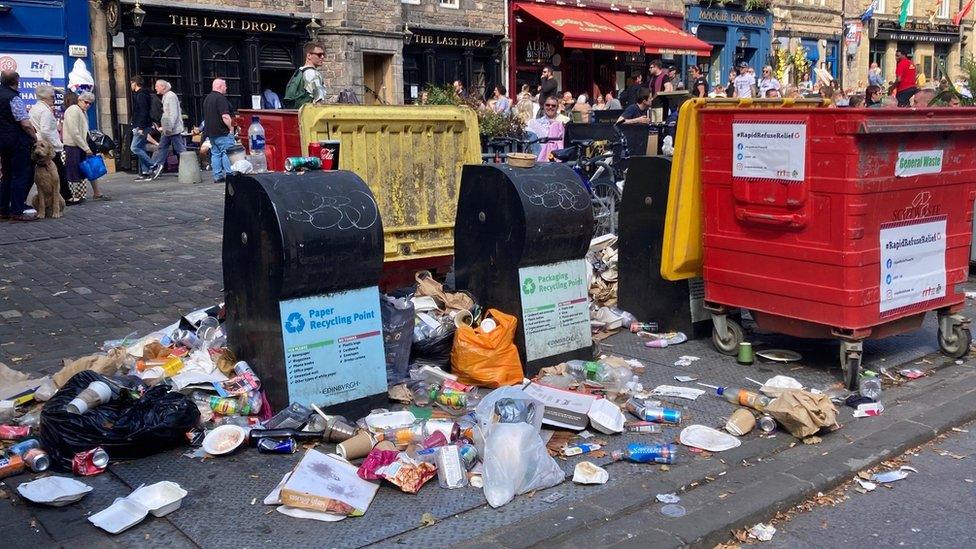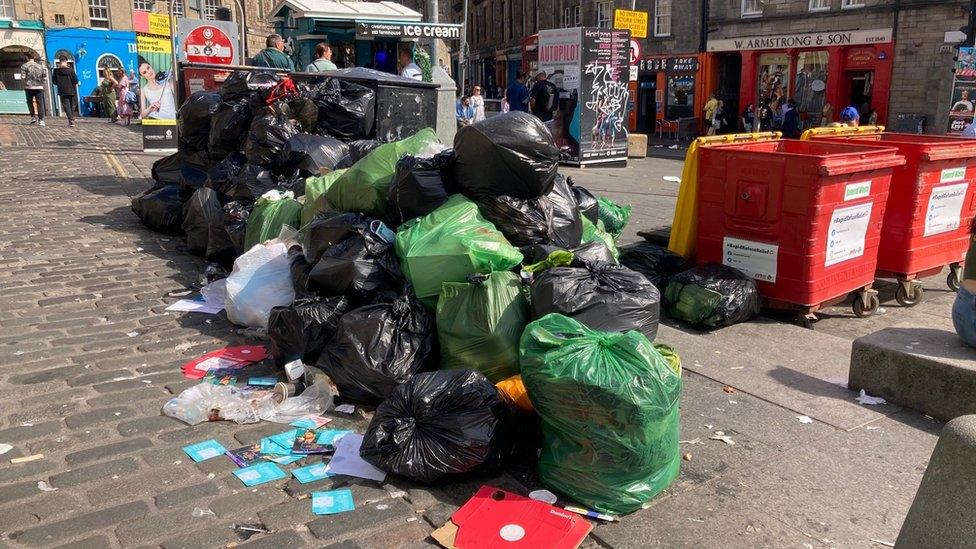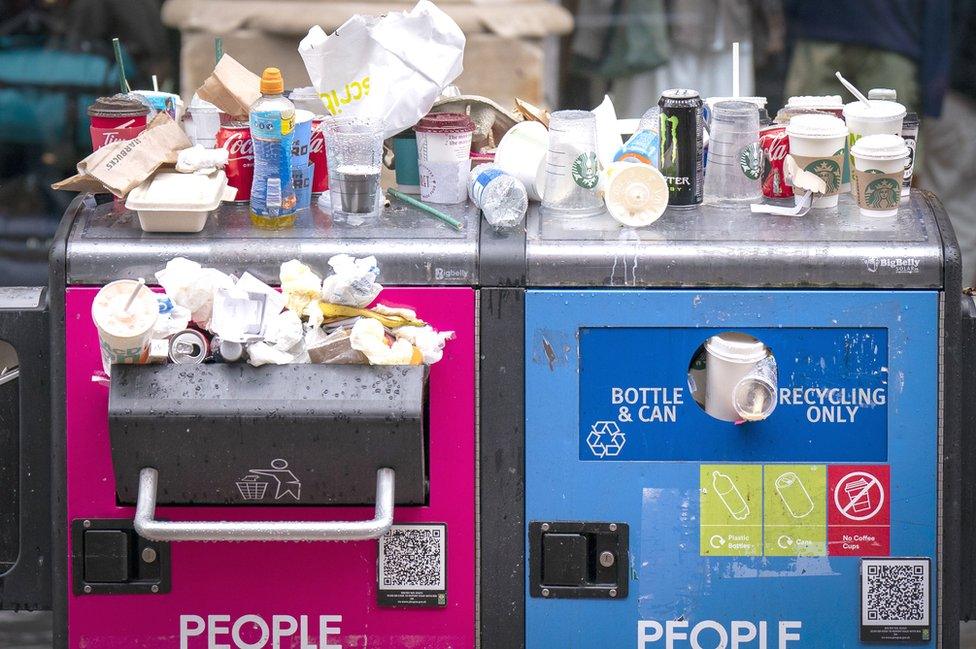Public health warning as bin strikes continue
- Published

Waste is piling up in Edinburgh's Grassmarket
Scotland's national public health agency has warned of a risk to public health as bin strikes continue across the country.
Public Health Scotland said people could be at risk from the build up of food, animal and human waste like nappies.
It has issued advice to councils to "decontaminate" areas where bins have overflowed.
The warning came as another day of talks to resolve the dispute ended.
More talks between Cosla and the unions are expected to resume at 14:00 on Sunday.
It is understood discussions are focusing on a new deal for the lowest-paid workers.
BBC Scotland has been told that no deal is imminent but "slow progress" is being made.
Public Health Scotland said the impact of waste on health depended on factors including the type of waste and the weather, external.
"If organic waste builds up it can become a risk to human health," the agency said.
"Organic waste includes food waste, animal waste (from food or excrement), human waste (including nappies) and manure."
It said it had recommended councils decontaminate public areas where bins had overflowed to reduce the risk to people's health.
And it issued a series of precautions people can take at home:
Wash hands when handling waste at home
Where possible, organic and medical waste should be stored in containers
If containers are not available, waste which is likely to rot should be double bagged
The public should avoid contact with refuse in public areas
The accumulation of waste may increase fire risk, so households should "consider their fire safety preparedness".
Deputy First Minister John Swinney has said the piled of rubbish building up throughout Edinburgh are "deeply concerning" for public health.

'Nobody wants ice cream when they're surrounded by rubbish'

Cameron Anderson works at the ice cream parlour in the Grassmarket
The owners of one ice cream parlour in the Grassmarket took the decision to shut earlier this week due to the mounting piles of rubbish in the street
Overlangshaw Farmhouse's shop, which is in a former police box, reopened on Saturday after a community effort to tidy the waste.
Cameron Anderson, who works at the ice cream parlour, told BBC Scotland: "This is our first day open since Tuesday which is awful because usually the Fringe is the busiest time of the year for us and we've not been doing any business.
"There were plenty of people about but nobody wanted ice cream when they were surrounded by rubbish. The sight of it is off-putting, the smell, everything - it was just a health hazard."
He said the situation was much better now.
A religious group - the Plymouth Brethren Christian Church - has put 30 trade bins in five locations across the city centre which will be filled, then removed by its volunteers.

Waste has been tidied into bags next to the ice cream parlour
"There's been lots of volunteers from local business, community members - they haven't been cleaning up the rubbish but just condensing it, putting it into piles," Mr Anderson said.
"It's making it much more bearable."
"We stand fully in support of the strikes and the workers," he added.
The waste has forced many street performers from the Grassmarket during the Fringe but on Saturday some were performing on nearby Victoria Street.

The refuse workers in Edinburgh are more than halfway through the two-week strike which has left bins overflowing and rubbish piled high during festival season.
Staff in a further 20 council areas are also now on strike, with the industrial action due to continue until the middle of next week.
Unions are seeking an agreement similar to the one made to council workers in England.
That included a £1,925 flat rate pay offer, which the union said would benefit the lowest paid the most.
BBC Scotland correspondent Jamie McIvor said the fact that negotiations were continuing was a positive sign.
He added: "The councils are very sympathetic to the claims being made by the unions, they understand the cost of living crisis and what that means for so many of their staff.
"It is that question of what councils can actually afford to pay, even with the extra £140m they have been given by the Scottish government."

Glasgow bin workers joined the strike this week and bins were already overflowing in the city centre
Council body Cosla said the Unite, Unison and GMB unions had rejected an offer earlier this week that would have meant the lowest paid 12% of council workers would get a pay increase of more than 5%.
It has also said the latest pay offer amounted to "one of, if not the best offer in decades for Scottish local government workers" with some workers getting an overall 7.36% increase.
Unite regional officer Wendy Dunsmore told BBC Scotland they are anticipating an offer in the "very near future".
Unions have called for more funding from the Scottish government to pay for an improved offer and rejected a request to suspend the strikes while further negotiations were held.
A Scottish government spokesperson said: "After constructive discussions over recent days, we are aware that Cosla held a meeting of local authority leaders to discuss a potential proposition.
"It would not be appropriate for the Scottish government to comment further beyond encouraging both sides to continue to seek a fair resolution of this dispute."